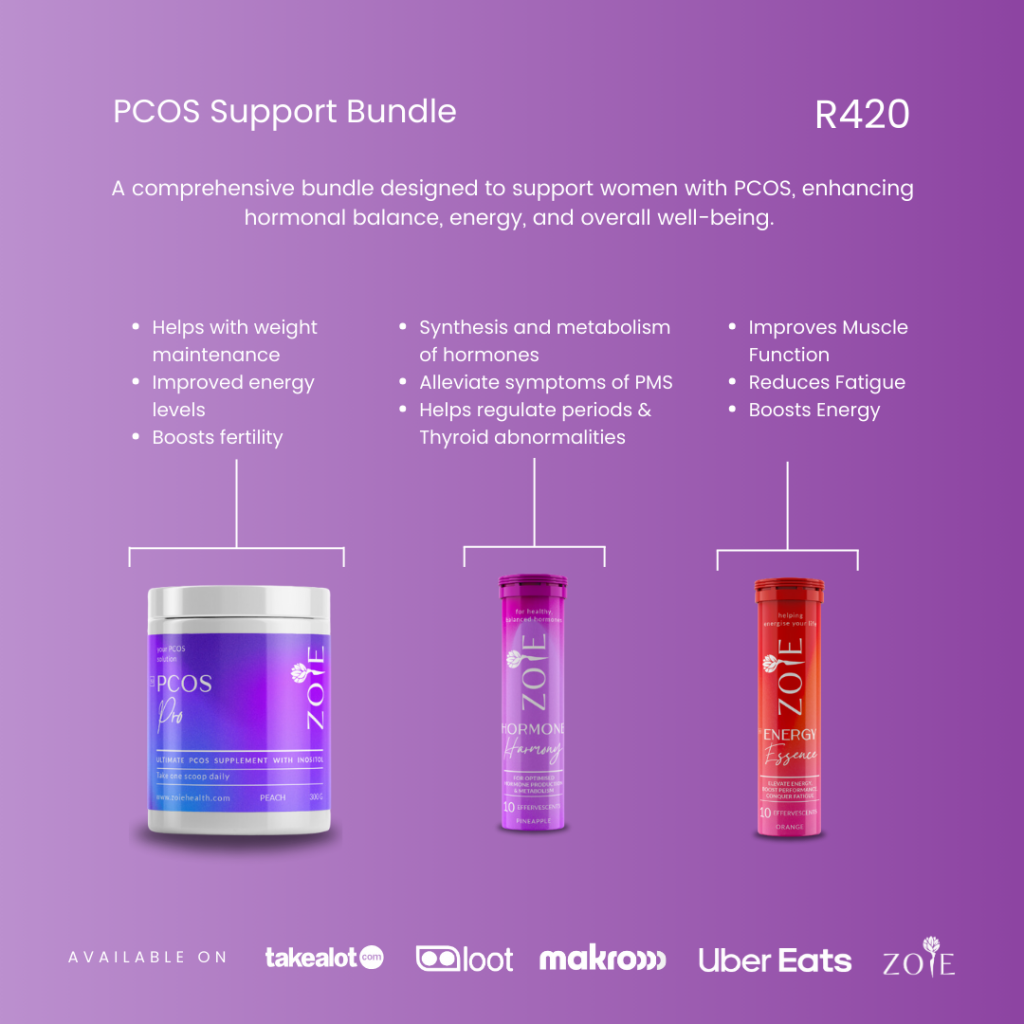By Cornelia Postma
Polycystic Ovary Syndrome (PCOS) affects millions of women worldwide, and one of the lesser-known but common symptoms is bloating. This uncomfortable feeling of fullness or swelling in the abdomen can be frustrating to manage. So, what’s the connection between PCOS and bloating, and how can you reduce it? Let’s dive into the key factors that cause bloating in women with PCOS and practical ways to find relief.

The Top Causes of PCOS-Related Bloating:
1. Hormonal Imbalances
PCOS is characterised by significant hormonal fluctuations that can lead to various symptoms, including bloating. The imbalance often involves low levels of progesterone coupled with elevated levels of oestrogen and testosterone. When progesterone levels drop, it can cause the body to retain more water and fat, particularly around the abdomen. This accumulation can create a sensation of fullness, making you feel puffy and uncomfortable. Hormonal changes can also slow down digestive motility, leading to increased gas and bloating as the body struggles to process food effectively.
2. Gut Health Disruptions
Many women with PCOS experience disruptions in their gut microbiome due to factors like insulin resistance and systemic inflammation. A healthy gut microbiome is crucial for proper digestion and nutrient absorption, but in women with PCOS, an imbalance can lead to digestive issues such as constipation, diarrhoea, and excessive gas. The resultant gas buildup can contribute significantly to bloating. Some studies have shown that improving gut health through dietary changes and probiotics can help alleviate these symptoms.
3. Insulin Resistance and Inflammation
Insulin resistance is a hallmark of PCOS that complicates metabolic health. When the body is resistant to insulin, it struggles to process glucose, leading to increased fat accumulation, especially in the abdominal area. This fat accumulation can heighten inflammation throughout the body, further exacerbating bloating. Chronic inflammation can also lead to increased intestinal permeability, which allows toxins and undigested food particles to enter the bloodstream, potentially worsening bloating and digestive discomfort.
4. Dietary Choices and Food Intolerances
The dietary habits of women with PCOS can significantly impact their bloating. Consuming high amounts of sugar, refined carbohydrates, and processed foods can trigger inflammation and worsen insulin resistance. Moreover, many women with PCOS report food intolerances—particularly to dairy and gluten—that can lead to digestive issues. These intolerances can result in gas, bloating, and other gastrointestinal discomforts, making it essential for women with PCOS to identify and avoid trigger foods.
5. “PCOS Belly” and Water Retention
Abdominal fat storage, often referred to as “PCOS belly,” is a common issue among women with PCOS. Hormonal imbalances, particularly low progesterone, can lead to fluid retention, exacerbating feelings of fullness and swelling. This bloating is not just about fat accumulation but also about how hormones affect fluid regulation in the body. Managing weight through diet and exercise can help alleviate this symptom.
6. Medication Side Effects
Several medications prescribed for managing PCOS can have bloating as a side effect. For instance, metformin, a common medication for insulin resistance, can lead to gastrointestinal disturbances in about 25% of users, including bloating, gas, and diarrhoea. If you experience bloating as a side effect of medication, consult your healthcare provider for potential alternatives or supportive therapies.
7. Digestive Disorders
Women with PCOS have a higher likelihood of developing gastrointestinal disorders like Irritable Bowel Syndrome (IBS) and Gastroesophageal Reflux Disease (GERD). These conditions can significantly increase bloating, gas, and other digestive problems. The overlap of PCOS and these disorders often means that women need a comprehensive approach to manage both conditions effectively.
8. Inflammatory Foods
Certain foods can trigger inflammatory responses in the body, worsening bloating for women with PCOS. Fried foods, dairy products, and gluten-containing items are known culprits that can lead to inflammation. Adopting an anti-inflammatory diet rich in whole foods, lean proteins, and healthy fats can help mitigate these effects and improve overall gut health.
9. Lifestyle Factors: Lack of Exercise and Poor Sleep
A sedentary lifestyle and poor sleep quality can exacerbate bloating. Regular physical activity promotes healthy digestion by stimulating gut motility, while quality sleep helps regulate hormone levels. Both factors are crucial in managing PCOS symptoms. Prioritising movement and rest can make a significant difference in reducing bloating.
10. Gas Production and Slower Digestion
Hormonal imbalances, particularly low progesterone, can lead to slower digestive processes, resulting in gas buildup in the intestines. Foods high in raffinose, such as beans, broccoli, and cabbage, can further contribute to gas production and bloating. By being mindful of food choices and optimising digestion, you can help alleviate this uncomfortable symptom.
A Holistic Approach to Managing PCOS Bloating
Addressing PCOS-related bloating requires a holistic approach. It’s not just about treating one symptom but understanding how hormonal imbalances, gut health, insulin resistance, and lifestyle choices interact to cause bloating. By making thoughtful adjustments to your diet, exercise routine, and supplement intake, you can reduce bloating and improve your overall well-being.
Managing Bloating with Supplements
In addition to lifestyle changes, supplements can be beneficial in easing PCOS-related bloating. Zoie Health Bye, Bye Bloat and Zoie Health PCOS Pro are designed to support digestion and hormone balance. Zoie Health Bye, Bye Bloat helps relieve digestive discomfort and reduce bloating, while Zoie Health PCOS Pro targets insulin resistance and hormone imbalance—two core factors contributing to bloating in women with PCOS. Incorporating these supplements into your routine, along with a healthy diet and regular exercise, can help you feel more comfortable and in control of your symptoms.

About Zoie Health
Zoie Health is at the forefront of women’s wellness, offering quality, affordable, and accessible supplements tailored to the unique health needs of women. With a focus on synergy, Zoie Health’s products are designed to work together, providing your body with the comprehensive support it needs to thrive. With our online Zoie Shop and Pharmacy, our unique virtual consultations, and vast communities of women, we strive to provide good quality healthcare to underserved populations.
Sources:









